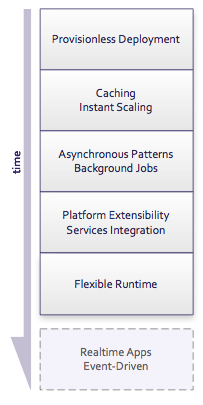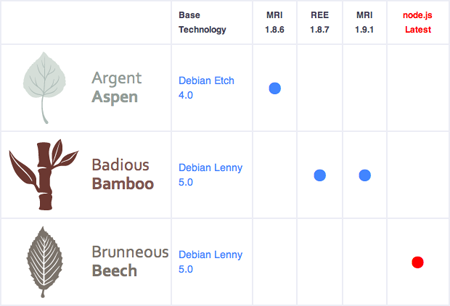Experimental Node.js Support
- Last Updated: April 12, 2024
UPDATE: Node.JS is now officially available on Heroku.
Today we’re offering experimental support for node.js to a limited set of users. We know there is a lot of demand, and will work with as many users as we can. See below for details.
A natural complement to Ruby
Yesterday we posted about how we think about the platform and make roadmap decisions. We are always looking for the next set of use cases to support, and lately we’ve been thinking about realtime apps and event-driven architectures.
 Today, most Ruby apps are synchronous. By default, all I/O blocks. If you’re uploading a file, polling a service, or waiting on data, your app will be blocked. While it’s possible to fix this by meticulously eliminating all blocking I/O from your code and dependencies, and using a library such as EventMachine, it’s tedious and as Adam points out: “Libraries like eventmachine will never be truly intuitive to use, because event-driven I/O is enough of a fundamental shift that it requires deep language integration. JavaScript, it turns out, is a fundamentally event-driven language because of its origins in the browser”
Today, most Ruby apps are synchronous. By default, all I/O blocks. If you’re uploading a file, polling a service, or waiting on data, your app will be blocked. While it’s possible to fix this by meticulously eliminating all blocking I/O from your code and dependencies, and using a library such as EventMachine, it’s tedious and as Adam points out: “Libraries like eventmachine will never be truly intuitive to use, because event-driven I/O is enough of a fundamental shift that it requires deep language integration. JavaScript, it turns out, is a fundamentally event-driven language because of its origins in the browser”
Node.js is evented I/O for JavaScript, built on top of the blazingly fast V8 engine. It makes handling event-driven I/O incredibly simple, and aligns perfectly with our maniacal focus on simplicity and developer productivity. The Ruby community has quickly adopted node, and with great reason. Complimenting existing apps with node.js for components that require real-time event handling or massive concurrency is both easy and elegant – in part thanks to the availability of frameworks such as express.
Simple to use
Node fits well into our existing architecture. It’s just another runtime selectable as part of our stacks:

Open Questions
Supporting node opens many questions on the platform: how are we going to charge, what version will we support, how can I integrate it with my current apps? We’re releasing this in experimental state now to collaborate with the Node.js and Ruby communities on this. Over the next months we will work together to provide answers to all these questions and more.
How to Participate
If you want to participate and use node on an experimental basis, drop an email to nodejs@heroku.com with your email address, what you want to use Node for, and we’ll work to include you in the program.
- Originally Published:
